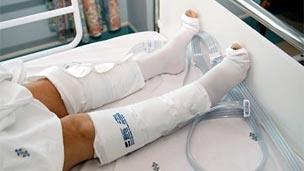Antipsychotic drugs 'appear to raise blood clot risk'
- Published

Blood clots are a serious condition that need prompt medical attention
Antipsychotic drugs taken by thousands in the UK raise the risk of dangerous blood clots, scientists believe.
The latest research, published in the British Medical Journal, provides the strongest evidence yet of a link.
People given antipsychotics in the past two years had a third greater risk of clots like deep vein thrombosis (DVT).
The Nottingham University study looking at 25,000 cases found the risk was even higher for the newer "atypical" antipsychotics.
Antipsychotic drugs are usually given to patients with conditions such as schizophrenia and bipolar disorder, but are sometimes used to ease persistent nausea and vertigo or to calm agitated dementia patients.
Higher stroke risk
Some scientists had already spotted a higher risk of clots in people taking antipsychotics, but the new study, which looked at more than 25,500 cases, appears to confirm this.
Almost 16,000 of the people in the study suffered a DVT and just over 9,000 suffered a clot on the lung, called a pulmonary embolism.
Those taking newer "atypical" antipsychotics had 73% more chance of developing a clot, compared with a 28% increase for other types of antipsychotic.
Patients appeared to be most at risk shortly after starting to take the new drug.
But the researchers stress that blood clots remain uncommon, and the increase in risk equates to only a handful of new cases per 10,000 patients treated with the drugs.
Nevertheless, they say that if other studies further confirm their results, the drugs might need to be used "more cautiously" for patients who either have less serious conditions, or who are at higher risk of clots for other reasons.
Also writing in the BMJ, Professor Giovanni Gambassi and Dr Rosa Liperoti, from the Centro di Medicina dell'Invecchiamento in Rome, said it was important for doctors to identify those patients at highest risk of side-effects.
Other studies have already revealed a higher stroke risk among patients taking antipsychotics, and Dr Sharlin Ahmed, from the Stroke Association, said that anyone concerned should contact their GP.
"Although the overall risk of a stroke is low, the results of this study remind us that antipsychotics are powerful drugs and should be prescribed carefully, with regular follow-ups."
According to the Medicines and Healthcare products Regulatory Agency (MHRA), the following atypical antipsychotics are licensed for use in the UK: amisulpride (brand name Solian), aripiprazole (Abilify), clozapine (Clozaril, Denzapine), olanzapine (Zyprexa), paliperidone (Invega), risperidone (Risperdal, Risperdal Consta) and zotepine (Zoleptil).
Blood clots can be deadly, with up to one in four patients dying within a week.